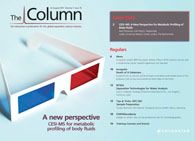Pittcon 2012 plenary lecture announced
The Pittcon Programme Committee has announced that Dr R. Graham Cooks, Henry B. Hass Distinguished Professor, Analytical Chemistry, Purdue University, Illinois, US, will deliver the Pittcon 2012 Plenary Lecture, titled ?Ambient Ionization and Mini Mass Spectrometers: In-situ MS for Everyone?.
The Pittcon Programme Committee has announced that Dr R. Graham Cooks, Henry B. Hass Distinguished Professor, Analytical Chemistry, Purdue University, Illinois, US, will deliver the Pittcon 2012 Plenary Lecture, titled “Ambient Ionization and Mini Mass Spectrometers: In-situ MS for Everyone”. The plenary lecture will be part of the opening session for the event, which will be held in the Orange County Convention Center, Orlando, Florida, USA, 11–15 March 2012.
The 2012 Pittcon Programme Chairman Joseph Grabowski commented, “We are very honoured to have Professor Graham Cooks as our plenary speaker. Professor Cooks’ research and instrument developments have been applied to societal issues ranging from the safety of food products, novel detection techniques in forensics, both routine and sophisticated analyses in the pharmaceutical industry, and to security at the airport, among others. His development of instruments and techniques applicable to the analytical chemistry aspects of life sciences enhance and complement our programme, which offers a significant number of presentations and posters directly related to the life sciences.”
Professor Cooks received degrees from the University of Natal, South Africa (now QuaZulu-Natal) and Cambridge University, UK. His interests involve construction of mass spectrometers and their use in fundamental studies and applications. His involvement in minimizing sample work-up and avoiding chromatography contributed to the development of the ambient ionization methods, including desorption electrospray ionization (DESI).
For more information about the event visit www.pittcon.org
This story originally appeared in The Column. Click here to view that issue.
Evaluating Body Odor Sampling Phases Prior to Analysis
April 23rd 2025Researchers leveraged the advantages of thermodesorption, followed by comprehensive two-dimensional gas chromatography coupled to time-of-flight mass spectrometry (GC×GC/TOF-MS), to compare and assess a variety of sampling phases for body odor.

.png&w=3840&q=75)

.png&w=3840&q=75)



.png&w=3840&q=75)



.png&w=3840&q=75)











